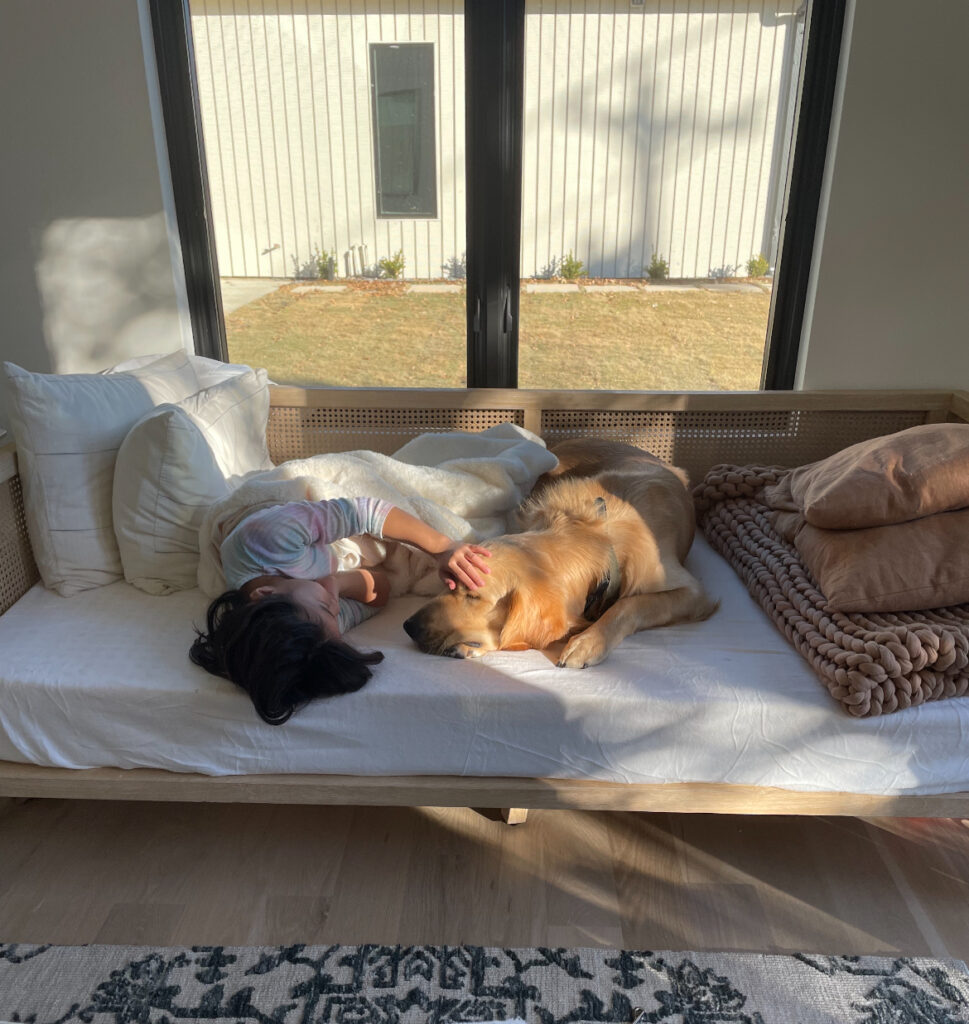My mission is to ethically provide healthy, intelligent, well-mannered, and highly adaptable Golden Retriever puppies to individuals and families. Our puppies receive an expansive 56-day (8 weeks) curriculum from many highly effective, peer-reviewed and proven educational programs such as Avidog (Early Scent Introduction and Early Neurological Stimulation,) Puppy Culture, SPCA Rule of 7’s, Volhard Temperament Testing, Puppy Brain, and Puppy Kindergarten.
As a professional puppy raiser, I aim to produce dogs for Therapy, Service, Individual / Family Companion, ESA (Emotional Support Animal) and Obedience Work. Furthermore, my pups are highly adaptable for other types of AKC events like Agility, Rally, Hunt, Tracking, Field Work and Dock Diving.
If Conformation is your thing, some of our pairings produce show-quality pups that can bring so much enrichment and enjoyment for the novice or junior handler. Colors range from dark gold gold to a very light gold depending on the mating. I am a small home-based breeder that keeps as closely to the standard as set forth by the Golden Retriever Club of America and of which I am a current member in good standing.
Furthermore, I utilize OFA which is the national database that holds records for dogs in the United States. The records that OFA holds produce dogs that receive CHIC Certification (Canine Health Information Center.) When a dog receives a CHIC certification, it means that the dog has met all of the health testing criteria from the national parent club which in our case is the Golden Retriever Club of America (GRCA). I have 15 years of experience breeding dogs. As a child, my mother raised Champion German Shepherds and as her helper, I learned the critical methodology and husbandry that is the foundation of my breeding program. You can learn more about OFA and CHIC here.
Before doing a deep dive into this website, I encourage you to check out this important resource from the Golden Retriever Club of America in how to select a breeder.

If you are sill here, then that means you’re seriously thinking of adding a Golden Retriever to your family. This website is not for the faint of heart. It is chock full of information and is always being added to and updated as information becomes available or obsolete. It does take quite a bit of time to read through it and think on things. Some people call me crazy but I believe that knowledge is power and having that can make all the difference in the world when it comes to health, safety and happiness for you and your dog.
Reading through these pages will help you develop a deep knowledge about the breed itself, what to expect from puppyhood; how to train your puppy; verifying health clearances, the importance of crate training; information about hidden dangers; Coefficiency of Inbreeding (COI); how to get involved with AKC events; what is CHIC and OFA?; grooming basics and recommentded tools, ans so much more you didn’t know you need to know. The Golden Retriever is the world’s most popular breed and there is a reason for that! They are the best dogs and they truly deserve the highest level of care we can possibly give them. An ounce of prevention is worth a pound of cure so equipping yourself with valuable and relevant information can and will reduce the risk of disease, injury, behavioral problems that lead to destruction of property, endangering their health, unneccesary frustration and costly or even deadly mistakes. Golden Retrievers are intelligent, intuitive, devoted, loyal and eager to be your best friend to the end of time. Investing your valuable time to learn all you can to understand what they need and what you can do to proactively protect them will increase their time (lifespan,) and an unparalleled quality of life.
Nerd Alert – Golden Retrievers were originally bred as a gun dog to assist the hunter in retrieving game that falls out of the sky (mainly ducks.). A well-trained Golden Retriever would sit patiently in the blind next to the hunter and will watch carefully in the sky. He will not be phased by the sound of a gun and use his sense of smell (which is 100,000 times greater than humans) and will track the landing of the game. Upon the command of the hunter, the Golden Retriever would be released and charge toward the game despite the terrain that he may have to encounter. Golden Retrievers are powerful, fast and excellent swimmers. Their double coat (never shave your Golden by the way) keeps them insulated in cold waters and well-trained retrievers will follow the commands of the hunter through various methods and will be able to change directions in order to locate the prey.
This prey drive is so strong that Golden Retrievers will seek opportunities in a domestic setting to fulfill their purpose.Golden Retrievers do best in homes that understand this high prey drive and are allowed ample opportunity to retrieve “game” and various toys will do the trick. :-). If you want to take it to the next level, you can check out AKC events using live ducks and attain their WC / WCX. It is important to be aware of this high prey drive so that you know what you are getting into. Pups need to be stimulated mentally and allowed to carry out the tasks that they were bred to do. The majority of Golden Retrievers that are rehomed are due to a misunderstanding of what is expected of a Golden Retriever. Golden Retrievers are wonderful family dogs and have so much heart. They live to please their owners and are usually devoted and emotionally intuitive of the environment. It can take up to two years for a Golden Retriever to fully mature and “calm down.” I do my best to teach our pups to stay calm and have self-control but the training must continue in the new home to reinforce what has been learned. Our puppies have been trained to not jump up on humans and not allow their teeth to touch hands. Puppies that are allowed to jump up and play aggressively with human hands will unlearn their good manners and become much more difficult to control which could inevitable cause injury to children, elderly or disabled individuals (as they grow to be 50-80 lbs within a few months of coming home.)
The process that I use for choosing a puppy for you and your family is based on the interview and the results of Wendy Volhard’s Temperament Testing. Day by day I focus on attention span, sensitivity, personality, energy needs and overall disposition. From birth to 3 weeks, I spend 15 minutes a day with each puppy. I am intensely focused on Early Neurological Stimulation, Early Scent Introduction and Exposure Therapy for grooming essentials. (Water, Dremel, Blow Dryer, Teeth Brushing, Hand Brushing, Qtips in ears, hands in mouth, etc.) After the third week to week 5 (Day 22-36) I spend 2 hours a day with the litter. The pups begin to become aware of one another. They begin mouthing and standing on all four legs. They topple over and begin to show dominance and submission. The “go-getters” are starting to emerge and the chill are unphased by the increased activity going on in the box. At weeks 5-7 I get on the floor with them to watch them socialize with one another and take note of independence and social interest in one another. I can start to see leadership and strong personality as well as submission and sensitivity. I also start individual swimming lessons as well as providing challenging barriers like ramps, wobble balls, bosu balls, untethered and movable tunnels and finding food through foraging are being utilized to challenge problem-solving, build confidence, and practice coordination. Week 7 is time for temperament testing and conformation evaluation. I enlist new people they have never met to interact with them to guage their tolerance for unknown persons and record how they react to different stimuli. I promise you that you will be delighted with your puppy. My contract has a well-mannered guarantee that I take very seriously. I want the transition to your home to be positive and smooth. It is my pleasure and privelege to prepare these babies to be the most wonderful and beloved dog you will ever own.
Because I want to pick the right puppy for your family who will bring so much love and joy to your home, I encourage you to carefully look over my website and contract (see below) to learn as much as you can about my program prior to our phone interview. This saves a ton of time for both of us as these pages are filled with so much useful and relevant information to help you along the way. Furthermore, reading through could answer a lot of the questions that you don’t know that you have yet and spark questions that you might have for me that may help you decide to move forward with your decision to get a Golden Retriever puppy and choosing me to be your breeder. Typically, there is a waiting list and I encourage you to resist the temptation to run out to buy a puppy out of temptation or a gift. I find the best outcomes are with individuals who do their research and due diligence so that they can make informed decisions to avoid buyers remorse, costly mistakes and potential heartbreak. I strive to do my best to convey as much information as I can that I think would be of interest to you to help you be the best Golden Retriever owner you can be! I would love to get to know you and see if our breeding program is right for you. Here is an example of some of the questions that I would ask during our initial interview to see if we are a good fit. You can jump over to the available puppies page here to see if I have any available. The phone interview is used instead of a puppy application. I find that to be a lot more successful to just have a casual chat rather than you filling out a form and wondering if I ever received it.
What made you decide on this breed?
What research have you done about this breed?
What previous experience do you have with owning dogs?
What other pets do you own now? If dogs, what breed? How many?
Do you have children?
Why do you want a puppy? What will make you a great dog owner?
Does your schedule have the flexibility to accommodate a puppy?
Who will be the primary caretaker of the puppy?
How many hours a day do you expect the puppy to be alone?
What do you plan to do with your dog (activities, etc.)?
Where do you live? In what conditions will the dog live? Do you have a fenced yard? How will you exercise the dog?
Do you have the necessary resources to ensure the best life for your dog?
Where will the dog sleep?
If you can’t keep the dog for any reason, will you return him to the breeder?
Do you have any more questions for me about the puppy or the breed?
The steps to obtain a puppy is by setting up an appointment for a phone interview with me. I find that to be a lot more successful to just have a casual chat rather than you filling out a form and wondering if I ever received it. You can contact me directly on my cell phone at 817-966-2977 via text to move forward with setting a time to have a conversation. This interview typically takes around 30 minutes. I will ask you questions first, then share a little more about the litter and the parents and finally open the call up to you asking the questions of me. At the end of the call, I will be able to determine if we are a good fit to move forward. At that point, I will ask for a $1000.00 non-refundable deposit which can be paid via Zelle, Cash or a cashiers check if you are close enough to drop it by. Please see my testimonial page and if you are interested in references, several of my families have offered their time to share their experience with me and to assure you that you can trust the process and me. Just ask me if you would like their contact information so you reach our to a Graceful Golden’s puppy parent for yourself to help you lock in your decision one way or another.
About our home- I ensure a safe and calm environment for the mamas to have fun and do what they were bred to do which is retrieving. Furthermore the 56-day enriching and challenging curriculum for the puppies provides the critical developmental milestones for them to become confident, curious, and well-rounded.
By providing this age-appropriate stimulation and activities, puppies build skills and courage to face the world with boundless energy. I believe in high-quality nutrition and supplementation which is optimal for growth and development and seize all opportunities to teach puppies commands, boundaries, and what is expected of them in a home-like setting. I follow the guidelines suggested by Kelly Nichols in her book Puppy Brain to capitalize on these critical developmental milestones to ensure a sound temperament and above-average intelligence.

GCH CH Hillock’s Jack Daniels x Jolly June Bug
Our pups come with the following:
-AKC Registration (which will be completed by the seller.)
-30 days of Accidental Pet Insurance to be enrolled in by the seller (You will get a certificate in your email.)
-Subcutaneous AKC Reunite Microchip implanted by the breeder and a temporary AKC Reunite collar tag will be provided. (The buyer is responsible to register the enrollment in order to be reached if pet is lost or stolen and order durable stainless steel tags with owner / pet information. Enrollment is at the following address. https://apps.akcreunite.org/cares-pub/ind/individualEnrollment.car
-1st (8 weeks) and 2nd (12 weeks) round of DTPP vaccinations, Dewormer, and a 3-month supply of Heartworm Prevention. Rabies must be given by a licensed veterinarian no earlier than 16 weeks. Your vet may tell you that you can go ahead at 12 weeks but my opinion is that the mother’s immunity from her own vaccinations may interfere with your pups ability to respond to their own vaccination. Better to wait until 16 weeks to be sure the mother’s immunity has worn off.
-Puppy Kit which includes a soft blanket with scent of mama and siblings, an Interactive Toy, a Plush Duck, a few days supply of puppy Hill’s Science Diet Large Breed Puppy (Lamb and Brown Rice) if needed.
Medication for Giardia and / or Coccidia will be provided at no additional cost (if found present in a fecal sample.)
The cost of a puppy from Graceful Goldens is $4500 There is a $1000 non-refundable deposit to reserve a puppy via cash, cashier’s check, or Zelle and the remaining balance will be paid the in cash upon delivery of puppy.
Pups go home at 8 weeks old. If for some reason you are unable to pick up your pup on pick up day, I can board your pup at $75.00 per day after pick up date. Furthermore, if you need me to transport your puppy to you and I am able to, the cost of transportation is paid by the Buyer and is added to the final sale to be paid via Zelle or Venmo 3 days prior to delivery of puppy. The cost of transportation has many variables and is negotiated and offered on a case by case basis to be agreed upon by the Buyer and myself.
HEALTHY: To that end, I use OFA (Orthopedic Foundation for Animals); CHIC Health Clearances; Conformation Standards, and Genetic Testing to guide mating selections. All my parents are OFA “CHIC” certified, Genetically Tested, DNA Profiled and lovingly raised in our homes. If you are unfamiliar with the term “CHIC,” The OFA created the Canine Health Information Center (CHIC) by partnering with participating breed specific parent clubs to research and maintain information on the health issues prevalent to those specific breeds. The Canine Health Information Center established a recommended protocol for breed-specific health screenings and created a registry so that potential puppy buyers can verify a dogs health. A dog achieves “CHIC” Certification if it has been screened for every disease recommended by the parent club for that breed AND those results are made public by the owner in the the database. When looking for a breeder, this term SHOULD be known. IF THE BREEDER DOES NOT KNOW WHAT “CHIC” is, you are NOT dealing with an experienced and reputable breeder, so if you decide to go that route I recommend that you proceed with an abudance of caution. If they say they have it, make them provide you a colored copy of their AKC certificates and provide the OFA links to their dogs. When verifying the information be sure to look at the AKC number on their certificate (with a purple border) and match it with the OFA. Dogs that have DNA Profiles will also be listed on the OFA site if you wish to verify parentage of your puppy. If the certificate does not have a purple border, their dog has a limited registration and they will be unable to give you registration papers for your puppy. In Golden Retrievers, the specific tests are for Eyes, Heart, Hips and Elbows. Genetic Testing on parents should also be provided and you want to be sure you stay away from any dogs that shows affected or two variants of a specific gene. IF the breeder provides Genetic Testing results from both the parents and the results show that they are CLEAR, you can rest assured your puppy will not get the genetic material that would cause them to suffer from the disorder and will be considered “Cleared by Parentage.”
WELL-MANNERED: All of my dogs are part of our family and they are loved and cared for in our home. They do not live in kennels and cages outside or in closed-off bedrooms. I spend many hours each day with the pups (especially in the very early days) paving the way for your puppy to be hard-wired for happiness with a desire to learn, please and be obedient. Every day is an opportunity to prepare and equip your pup for life and and I am keenly aware of my responsibility to each and every one of these darlings! My pups leave my care knowing what is expected of them and are ready to connect, learn and love you and your family. This is what I do FULL TIME. I do not have another job that I have to juggle and split time and attention. This makes a HUGE difference in the quality of the puppies that come out of my breeding program. I am proud to say that my puppy parents are always giving me positive feedback that makes me feel so good about what I am doing. I personally train all my dogs and puppies and do my best to ensure a warm, loving and stimulating environment. Furthermore, I am always looking for ways to seek out innovation and design to seize all opportunities to teach puppies boundaries and what is expected of them in the short time they are with me.
BEAUTIFUL: A beautiful dog is a well groomed dog. Each of my dogs are hand-brushed every single day. I have a small pack so it’s quick and since they are brushed daily, its not a huge undertaking. After meals, my dogs get a quick tooth brushing and dental chew or tablet that has enzymes to fight bacteria and keep their teeth looking bright and disease-free. Each of my dogs are professionally groomed every four weeks with professional toothbrushing and plaque removal for any build up that may have occurred. When we have puppies running around here, I do begin brushing the puppies around 5 weeks of age as well as well as do exposure therapy with a dremel for nails and a toothbrush in the mouth on their milk teeth so they don’t freak out when they are older. I wash their faces every few days with wet wipes and clean their ears every week and put a few drops of ZYMOX Ear Cleanse to keep them healthy and pink. Zymox Otic is used for 3-7 days if their ears start to look red and angry. It is important to check your dogs for signs of decay and build up on teeth and ears and keep nails trim because dogs cannot tell us that they are in pain. Signs of pain are very obvious and should not be ignored. That is part of being a good dog mama and daddy and you can expect me to ask you about that during our initial interview. Proper nutrition is essential for a shiny and soft coat. I provide the highest-quality nutrition available on the market as recommended by our Reproductive Veterinarians. (Science Diet + Raw veggies / fruites + dehydrated beef livers / hearts). I included vitamin E, Biotin, and Fish Oil daily which is optimal for general health, bright eyes, solid bones and lustrous fur. I recommend single ingredient treats to avoid processed foods so steer clear of treats that have a bunch of chemicals. I use OXY MAMA prenatal and postnatal vitamins during gestation and lactation as well as OXY MAMA Calcium as a topper on their foods to make sure the pups aren’t stripping too much from mama’s bones and teeth. Puppies receive PET TABS Multivitamins every single day once they start on solid foods.
A WORD OF CAUTION: Experienced and reputable breeders have made a significant investment and their fees reflect that investment. Unfortunately, I have heard my puppy buyers tell me very sad stories when they are shopping for their puppy that they are shocked and appalled by the conditions that the puppies and dogs are living in. They were lured by a cheaper price but were appauled by the condition in which the puppies were in. There were stories of how puppies are covered in feces and urine and adult dogs with tails tucked under their bodies that won’t approach and say hello and that is IF they are allowed to view the home. Unfortunately, there are many individuals that breed dogs like this to make a little side money. They tempt you in with a cheaper price- but are not interested or financially able to invest money in testing, radiographs (XRAYS) and DNA/Genetic testing to verify the health of their breeding dogs. Furthermore, they typically have a main job and do not have the time to take care of the mamas the right way and raise up happy and healthy puppies that will be a part of your family for life. The sad fact is that those neglected dogs are subjected to continually being bred to exhaustion and their puppies are not mentally or emotionally equipped to become a loving and confident pet. These are the puppies and dogs that end up being territorial, aggressive, anxious, depressed and timid. Unfortunately, these pups are wired this way for life and many end up in shelters / re-homed because puppy parent(s) cannot deal with the intense behavioral issues and and are not willing to risk their families from experiencing traumatizing accidents. The reason that I am mentioning this here is because it is my hope to bring about awareness so that you can avoid these types of people and stop the cycle of irresponsible breeding by being informed and thinking critically about the decision to purchase a puppy. You have probably heard the saying, “You get what you pay for” and this is very true in this case. Bringing a puppy into your lives is a huge decision and you want to be sure to get the highest quality pup that you can afford. You don’t want to try to get a bargain on a dog, trust me. You want this transition to go smoothly and it should be a pleasant and joyous occasion for everyone involved including these precious sweet souls that are so unconditionally loving and loyal to us humans.
UPCOMING PLANNED LITTERS
Holly X GCH CH Hillock’s Jack Daniel’s Summer 2026
This video is of Daniel’s win at the Westminster 2020. You might need tissue for this one. I cry every time I watch it.
Holly
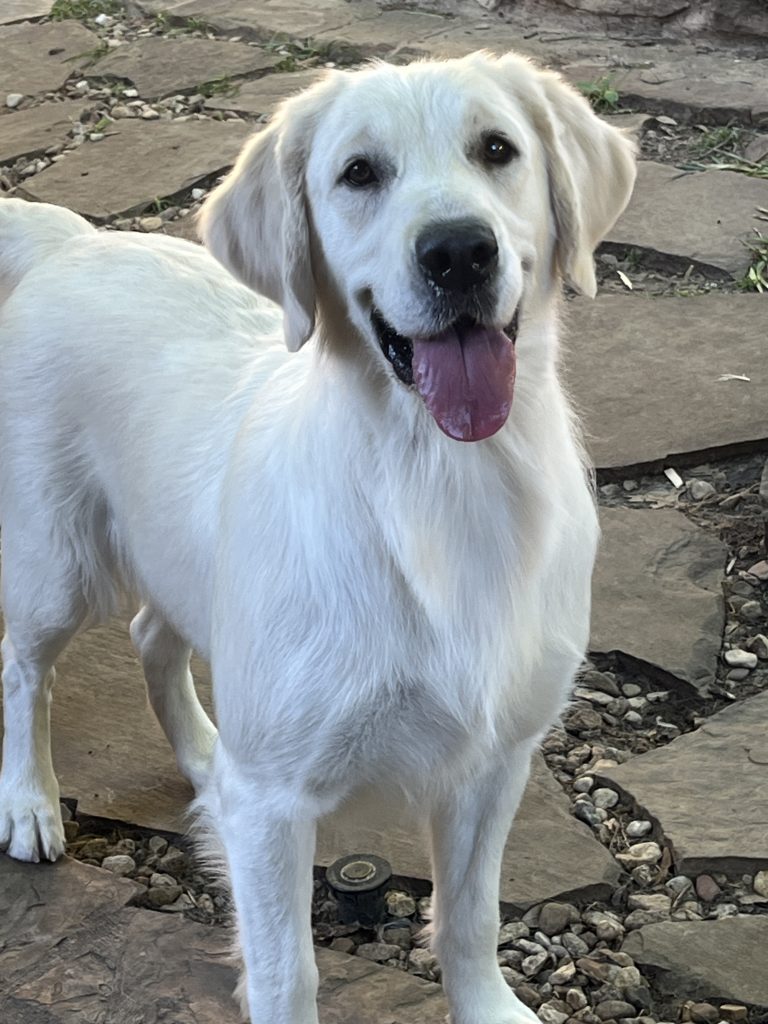
You can go directly to my AKC page for more details regarding the upcoming litter here.
Previous litters by Holly x Daniel “Wicked” Litter 1-14-25
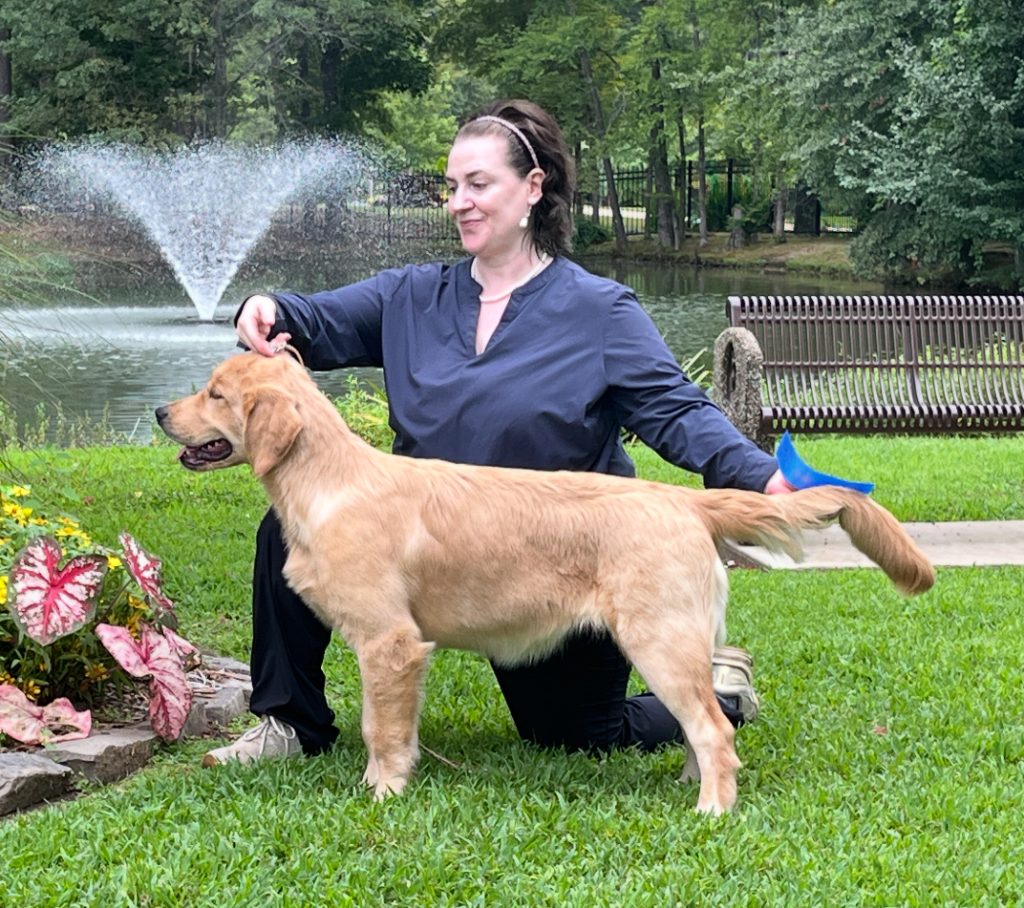
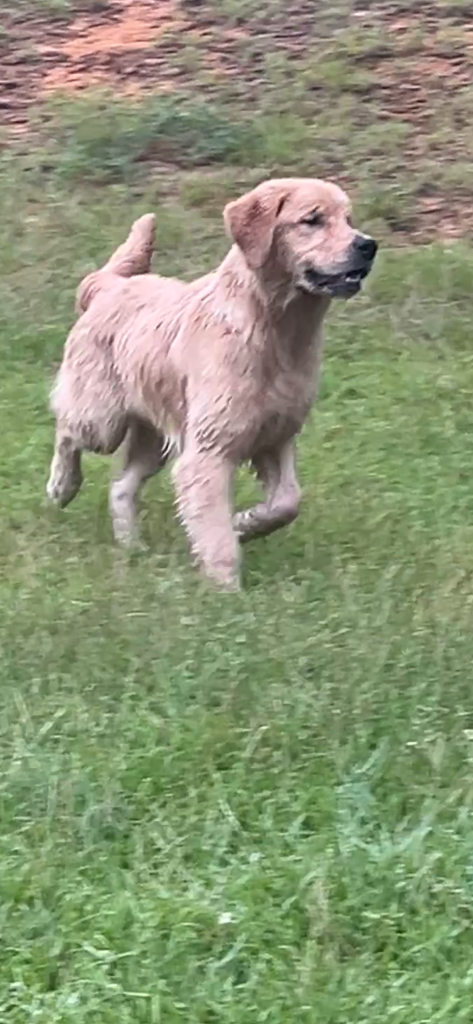
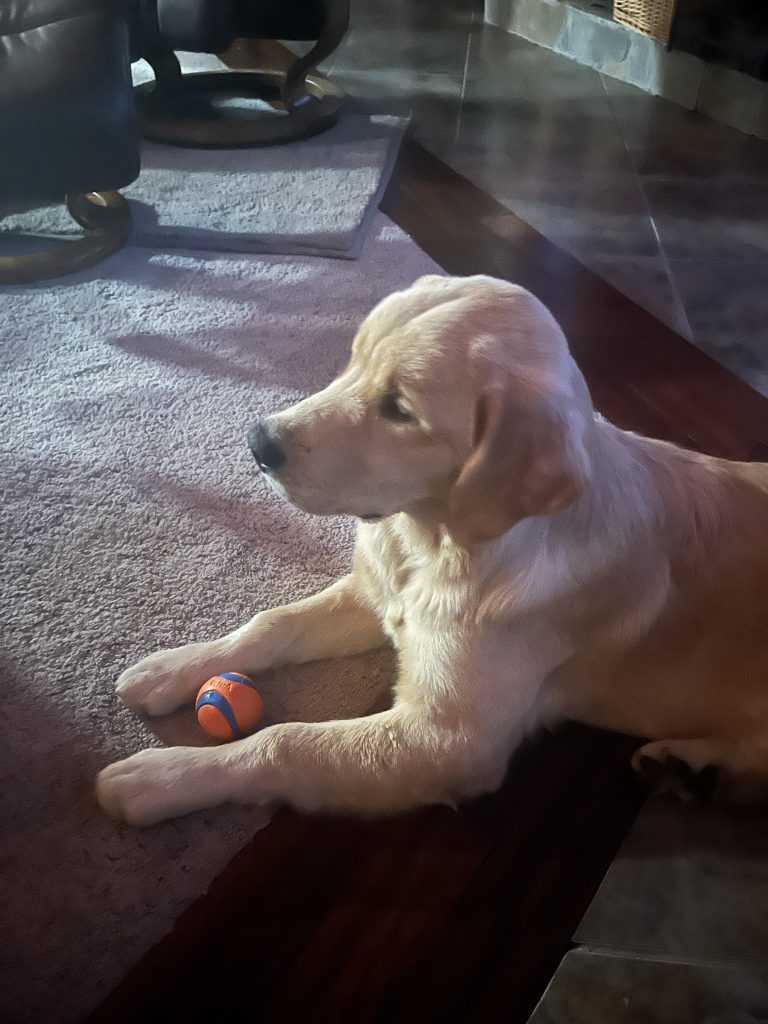
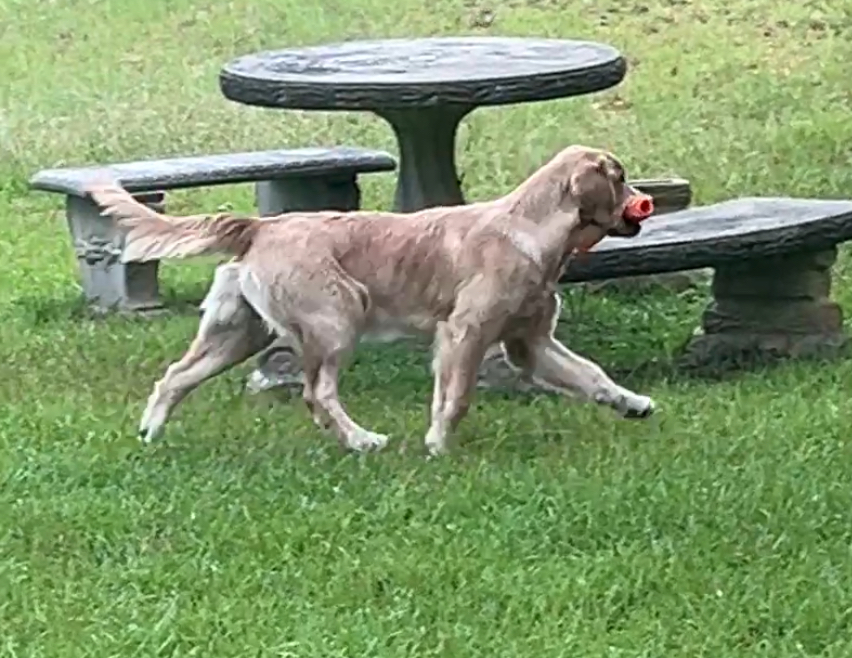



Holly x Daniel “Frozen” Litter 9-10-25

Graceful Goldens Frozen River of Styx (River)


(Piper)
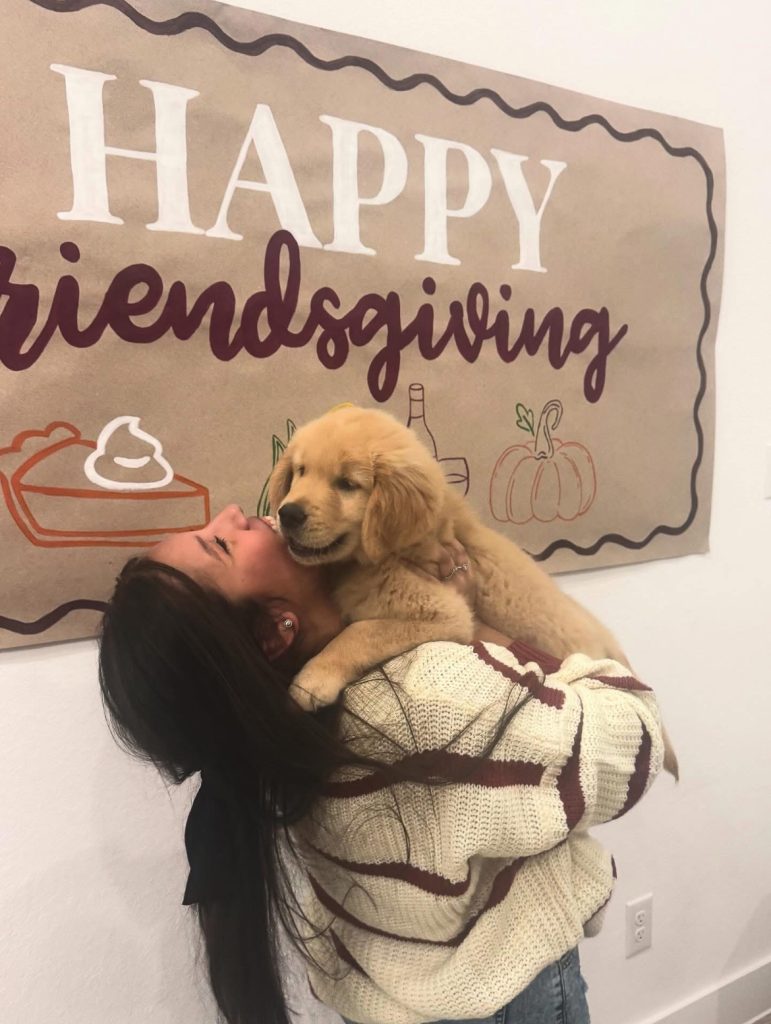
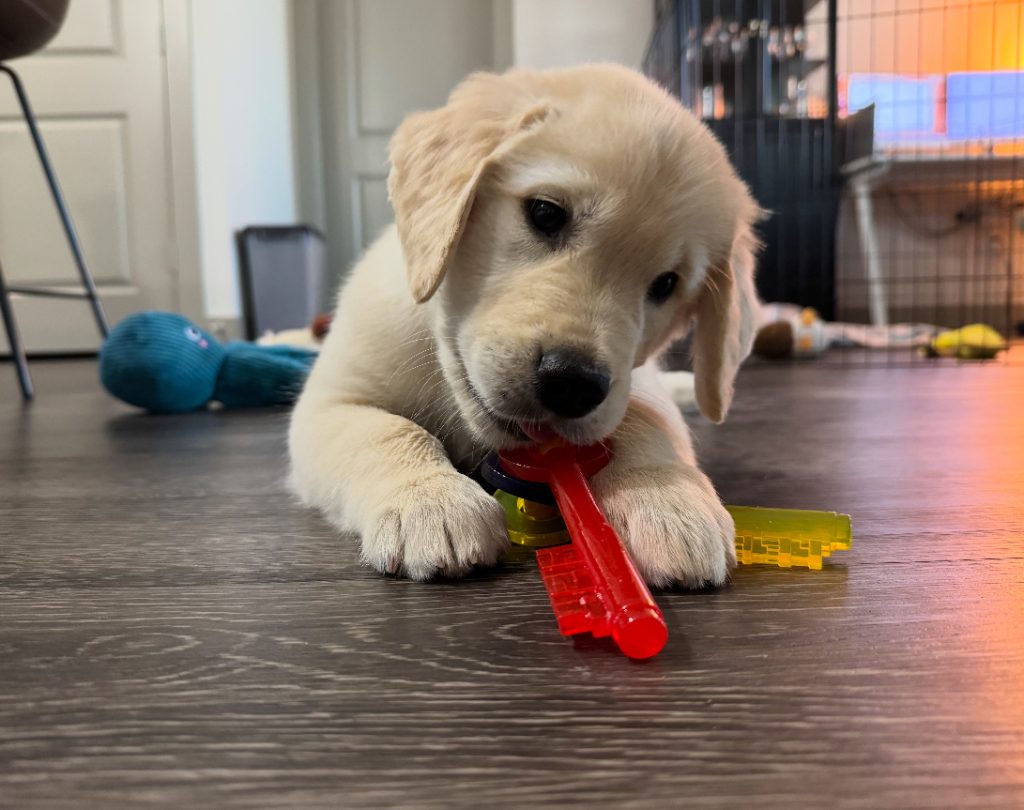

Graceful Golden’s Frozen Somewhere Over the Reignbow





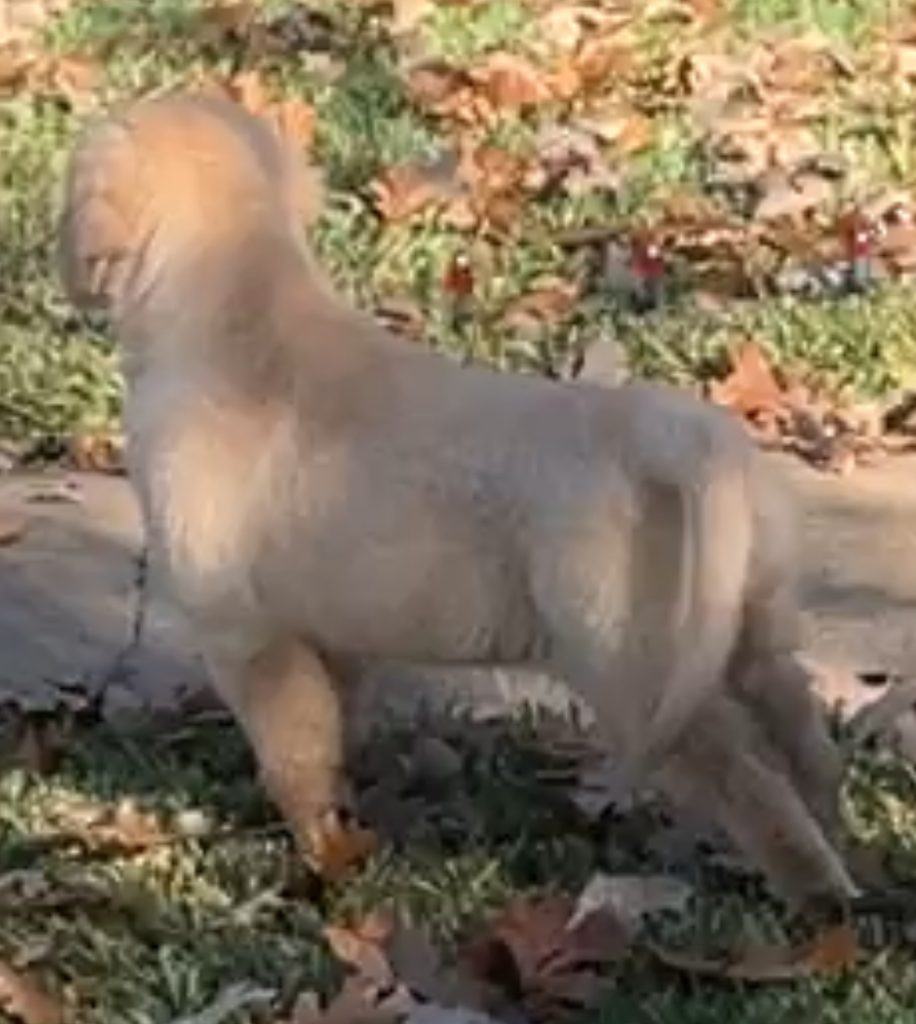
GCH CH Hillock’s Practical Joker x June Summer 2026
GCH CH Hillock’s Practical Joker (Prank) sits at No. 12 in the country as of today (Dec. 6, 2025)

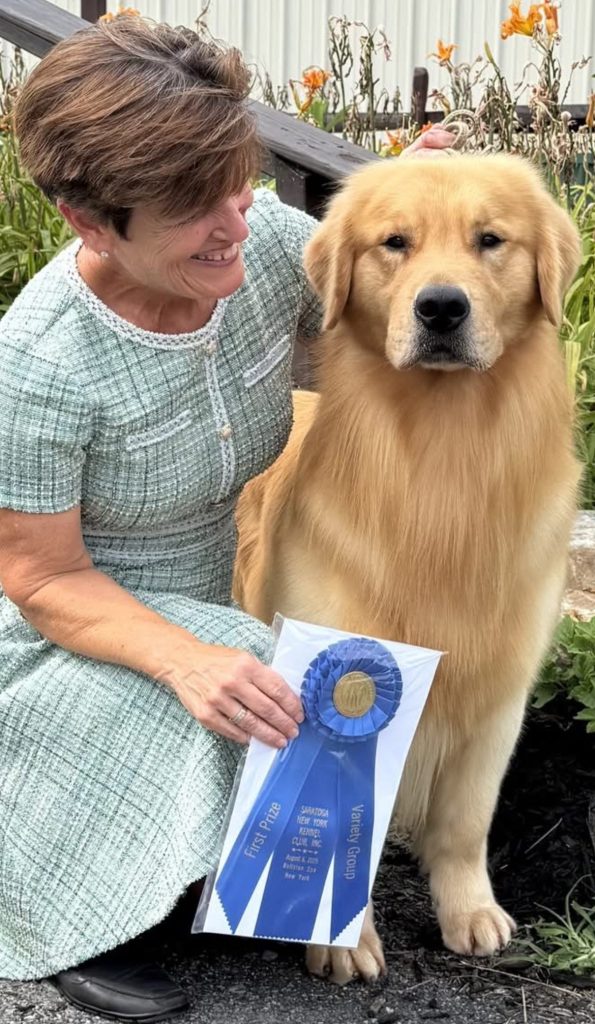
Prank is a second cousin to Daniel. We feel his structure, movement, coat and bone will balance out with June nicely and we are so excited to see what the pairing produces! June has completed her CGC and AKC Fetch Novice and will be working toward advancement and possilby scent work. Right now she is now learning how to use buttons to ask for specific things.
Here is our June-bug checking the mail. She is super smart, easy to train and eager to please. Her OFA CHIC and HEALTH CLEARANCES can be found here: https://ofa.org/advanced-search/?appnum=2517885
GCH CH Hillock’s Jack Daniels X Graceful Goldens Sweet Ethel
Ethel has passed her clearances and are awaiting her CHIC certificate. I anticipate an early Fall litter if everything works out as we are hoping. These pups will look quite a bit like the Holly X Daniel pairing.
Early Training
It is imperative to begin training puppies as soon as they are ready. This produces a dog that is very intelligent and biddable. We want our dogs to be obedient from the earliest possible moments of their development which transitions puppy parents smoothly when they go to their new home.
The following video depicts me training six-week old Fred who is mastering the AKC Puppy S.T.A.R. program.
Personality, Temperament and Behavior
Personality, temperament and behavior are what makes up a puppy’s overall presence. I will break them down here to help you have a better understanding so that you can keep this in mind when choosing your next best friend.
Personality is inborn. It describes introversion and extroversion. Just like people, puppies are born with a hard-wired personality. They can be shy on one end of the spectrum to boisterous and bubbly at the other. As a breeder, I begin to see this within days of birth. I can tell who is going to be ready to conquer the world and who would prefer to watch it go by. You will want to find a puppy that matches your family. If you have kids with high energy, then an outgoing puppy who will want to play is the right choice. If you are an elderly person looking for a companion, maybe a little more low key would be the speed to choose.
Temperament is a type of behavior that is not influenced by learning. It is also inborn like a personality. An example would be a puppy that loves to retrieve versus one that does not. It would be the dogs ability to tolerate new experiences with curiosity and wonder to indifference. I have had puppies from the exact same litter where one puppy would prefer to love on their person and cuddle rather than play fetch all hours of the day. If you are not interested in taking your puppy out to play three or four times a day for 20 minutes at a time then you would probably better suited to the pup that wants to lounge around being lazy and chilling out. As I ask you questions about your family, I am trying to find a good match to set everyone up for success!
Behavior is what is created from learning. It is dictated by the environment and stimuluses. Careful and intentional interactions to help build trust and opportunities of learning create confidence and interest. As the days pass and puppy is exposed, behaviors will emerge from their personal history day by day. These positive and negative experiences will influence behaviors that you will begin to see trending. Be ready to spend time with your puppy. Be ready to think about these experiences that you are intentionally providing. An example might be knowing a bad storm is coming and being there with your pet as the sound of thunder rolls through the house. You might even try playing the sounds of a storm ahead of time (exposure therapy.)
Just like human beings, puppies are social creatures and are influenced by every single stimulus; positive and negative. It seems simple to think that every pup would come with a clean slate and how YOU bring them up is going to determine the kind of dog they turn out to be. Yes, the way you raise them is vitally important but more than you might realize, the personality, temperament and behavior of a puppy begins long before their birth. It is imperative for a good breeder to know this and be prepared to provide the right environment for the expecting mom and her upcoming litter. Research has shown that a stressed mother will often raise puppies who go on to show emotional and behaviroal problems. Factors like extreme temperatures (from being left outside), parasites, illness, diesease, inadequate nutrition, physical, mental, intellectual and emotional neglect all wreak havoc on the pregnant moms overall health and well-being. When the mom is treated with care, love and special attention for the duration of her gestation (which is 63 days), her babies will be more likely to be emotionally stable and be born with a tolerance and desire of being handled. It is important that the mother is cared for in a way that helps her feel safe and secure.
Furthermore, a good breeder will pay close attention to the temperament of the Dam and the Sire. Especially important is the temperament of the mother as the puppies will be learning how to behave in various situations from her in the the first eight weeks of their lives. This is the time when the puppies soft skills are learned (social skills, communication, learning ability, conflict resolution, dealing with frustration, etc.). If the mother has a nervous, worried, possessive or fearful temperament, those traits will likely be passed down to the litter that is learning from her. That oftentimes translates to a puppy with behavioral issues from the very beginning. That is the last thing that you and your family will want to deal with.
Here is a checklist of questions to consider when finding the right breeder:
- Does the breeder rear the puppies in their own home? Puppies raised in the home are going to have similar experiences that are in your own home. If you are looking for a pup to live in your home, you want their earliest experiences to be domestic ones. This will make a lot of your training go more smoothly because they have been exposed to typical sights, sounds, smells, and experiences of day-to-day living.
- Are you able to see the puppies with their momma? This is important because you will want to see the interactions between the mom and her pups. Is she gentle and loving? Nurturing and playful? This is HUGE!
- Do pup and mama look happy and healthy? Are their energy levels high? Are ears and eyes clean and bright? Are tails wagging? A mama dog who has recently had puppies might look a bit tired but does she look relaxed and content?
- Does the breeder have other dogs in the house? Are they happy, friendly and wagging their tails?
- Does the breeder have several different kinds of breeds and ages? This is often a red flag and can indicate a puppy farm or unscrupulous breeder. Proceed with caution.
- Health Tests and Genetic Reports: Make sure you get a copy of DNA and any health clearances of parents and grandparents. OFA reports can be verified through OFA
- Ask the breeder if they are going to be available for follow up questions and advice. Good breeders are keenly interested in keeping up with their puppies for life if need be.
- Does your breeder have references? IF they have a website, look for testimonials.
- Does your breeder have questions about your lifestyle, home and family dynamics? A good breeder wants to be sure that the puppy that they place in your care is a good fit so be patient with the inquisition. 🙂
- Do you feel that you can communicate well with the breeder and that you feel comfortable?
As you can see, it is important to keep these things in mind when beginning your search for your new family friend. Look for a breeder who has happy and friendly dogs. Ones that are raised in the home and that are dearly loved and treated like family. It makes a world of difference. Link to American Kennel Club Page
Important Facts to know about Golden Retrievers
According to the Golden Retriever Club of America, “Goldens are a Sporting breed and need regular exercise, and this is most pronounced during puppyhood (up to approximately two years of age). While most Goldens can adapt to a less active lifestyle once they are mature and trained, puppies and adolescents often have energy to burn. If not given an appropriate outlet, this energy may be channeled into behaviors that are destructive and appear “hyperactive.” And even though the puppy is mentally still a youngster, physically he may be a strong and sizeable dog that can be difficult to manage when energy is pent up. Rule to remember: A physically tired puppy is a well-behaved puppy!”
